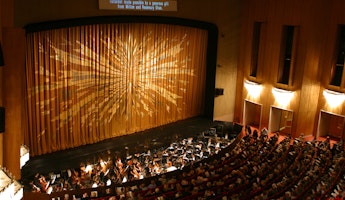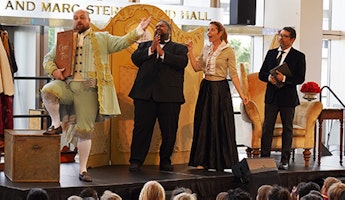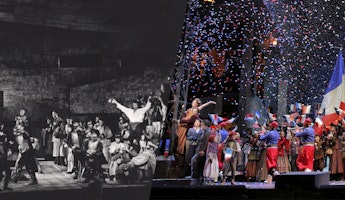Blog
May 24, 2022
Becoming "Aida": An Interview with Latonia Moore
Opening night marked more than just Latonia Moore's house debut. It was about the 150th time she performed Aida. Even though she's sung this role (literally) hundreds of times, Latonia still learns something new each performance. We spoke to her about all-things Aida, her illustrious career and how it feels to perform on our stage.
HOW HAS YOUR INTERPRETATION OF AIDA CHANGED OVER THE YEARS?
I first sang Aida in 2009, but I wouldn’t say I came into my own with the role until 2016. That first time, I had to learn it really fast and my voice hadn’t grown into it. After that I did a couple of concert versions and then my first big production was in Hamburg in 2010.
I didn’t know if this was a role I should actually be doing, but the conductor said “we can hear what your voice will grow into; just sing it with your own voice. Sing it like you sing Butterfly.” It took more time than I thought but the more you do it, the better it gets, the more nuance you’ll find. It was the same for me with Butterfly; when I first did it, it was really good, but it changed meaning after I had children.
I’ve now sung Aida about 150 times. This time around, I didn’t think there was much left to find. I was wrong. I've learned a lot from my colleagues and also from the maestro. This cast has very lyrical singers, and I think this makes it more human, more emotional.
When the audience gets there, everything changes. I draw lots and lots of energy for the audience. With a room full of people paying attention to our story, I feed off their energy and feed it back to them.
IT SEEMS LIKE COMMUNICATION IS WHAT’S MOST IMPORTANT TO YOU.
Definitely, that’s my forte. It's not just a voice; I'm a better communicator than singer. There’s a reason I chose opera and not concert. A lot of people sing gorgeously and that’s it. They don’t want to act, because they want their voices to always sound completely perfect. For me, that misses the point. It’s a play, sung classically. So if they’re just singing pretty notes, “see ya!” Audiences come to see us bring characters to life. That’s what opera is. There’s also an emphasis now on Hollywood looks. I get it, but some people forget about vocalism completely. Those people are also missing the point.
My aim as a singer, and as a mentor to young singers coming up, is to bring opera back to the definition of what it is. The big reason I became an opera singer is to transform into another person. I can be anybody. The reason why opera was created was so people could do exactly that: an Italian singer playing someone from Sri Lanka, for example. But some people only want singers that look like their parts because they think it’s not believable otherwise. Sometimes I'm cast as Aida because I'm Black and I know that. But I'm just as satisfied with a white Aida. I don’t think you need a Japanese Butterfly. Hopefully we can get past that.
ARE YOU FINDING MORE DIVERSITY ON THE STAGES WHERE YOU PERFORM?
LA Opera has done an amazing job. This is a very diverse cast, a real rainbow of talent on our stage! Actually, the only thing not so adventurous is to cast a Black Aida like me. In my career, Russell Thomas has been my only Black Radames. There are plenty of men capable of singing it, but you seldom see that. I’ve never really seen this opera as a story about color or race. It's a political story. It doesn’t matter what these two lovers look like.
Russell and I are having some fun. In the tomb scene, he is surprisingly emotional and sensitive. He seems to melt into me. It's comfortable to have George Gagnidze, Morris Robinson and Peixin Chen in the cast, since I’ve sung with them many times before. The new person to me is the Amneris, Melody Moore, a beautiful soprano in a mezzo-soprano role. When they announced her as Amneris, I thought “oh, this is going to be interesting.” She's done so much work as a leading soprano so she’s accustomed to really delving into the emotions of a role. Our version of the Aida/Amneris relationship is way more emotional, visceral and real than usual. They’ve developed some sort of affection for each other. Amneris really thinks of Aida as her friend.
Of course, Aida never forgets that she’s the princess of Ethiopia; she’s just like her father. That's another thing about Aida: her strength. I think sometimes with Aida, you think of her as “oh, woe is me” all the time. But when you delve into the lyrics, everything has a strength to it: strong and drastic. There’s some real truth telling in what she’s saying. Early on, she says that she is going to take her love for Radames to the tomb. And that’s exactly what happens.
YOU’VE PREVIOUSLY DESCRIBED AIDA’S BIG ARIA, “O PATRIA MIA,” AS “THE BEAST OF ALL BEASTS.” HOW SO?
Even if you take it separately, out of the context of a complete opera performance, it’s one of the most difficult soprano arias of all time, one of the hardest ever written. There are two reasons why. First, you’re constantly singing in the passaggio, a very precarious part of your voice where it transitions between registers, and then you have to break out a high C. The entire Nile scene is a bitch because of that. It's very exposed. The other reason is that it’s an aria that doesn’t convey a lot of new information. For a singer like me, that makes it really tough to use the storytelling aspect of it to my advantage. For example, her earlier aria, "Ritorna vincitor,” is a recitative sort of aria; I can use the words, emotions and story to propel it forward. You can’t do that with "O patria mia.” She repeats certain words over and over and over again. Over the years, I've developed my own way through it. But it's still hard for me.
YOU HAD GREAT SUCCESS IN TERENCE BLANCHARD’S FIRE SHUT UP IN MY BONES AT THE MET AND IN CHICAGO, AND YOU’LL BE BACK AT THE MET NEXT SEASON IN BLANCHARD’S CHAMPION. ARE WE AT THE TURNING POINT FOR OPERAS CREATED BY BLACK COMPOSERS THAT TELL STORIES ABOUT BLACK CHARACTERS?
It’s a turning point, for sure. And it's also political, for sure. That said, regardless of why these companies decided to put on these operas, the shock was how well audiences have received them. When we were about to open Fire, we thought it could go one of two ways: it could be one of the greatest things ever put on at the Metropolitan Opera, or it could completely tank. When we got to opening night, the audience just exploded. You could tell how deeply the audience was affected, not just by the performance but by the story: no matter where you are in the world, you see moms struggling to take care of their children. It made an impact nobody was prepared for.
For me, as a Black opera singer, it’s an amazing thing to see. Black singers are getting a lot more opportunities. The downside is the potential for being pigeonholed. In the past many singers didn’t want to do Porgy and Bess, because that’s exactly what happened. Although I applaud that they’re putting on Black operas, I'd love to see Black singers more in standard repertoire. With the exception of one role, Butterfly, I've only played Black characters at the Met so far.
YOU’LL BREAK THAT PATTERN WITH MUSETTA IN LA BOHÈME AT THE MET NEXT SEASON.
It's funny, when conductor Yannick Nézet-Séguin and I were talking about things I could do at the Met, he was throwing all kinds of stuff out there. I said “I really want to be in Bohème,” since I love that big Zeffirelli production. I've done plenty of Mimis, it’s how I began my career in small houses in Italy and Germany. He said: “What about Musetta?” For real? “Yeah, we’ve had big voiced Musettas here. Aren’t you ready to have some fun on stage? You'd be hilarious, you’d steal the show.” The last time I got to play such a fun character was my professional debut as Despina in Così fan tutte. And I cannot wait! I think it’s going to be a lot of fun.
HOW HAVE YOU BEEN ENJOYING LOS ANGELES SO FAR?
A lot of times, even if I'm doing the leading role, they don’t put up my picture. They put up a photo of a model or something. It's always bothered me and it makes me feel like I'm not pretty enough. I get here to Los Angeles, three days before rehearsals. I'm walking up the hill toward the theater, huffing and puffing, and when I get to the top, I look up and I see my face on a poster. The whole street is lined with posters of my face. I'd never seen that before, ever. I didn’t know what to think. My jaw dropped. I walked past Disney Concert Hall to the Music Center, and then I saw my face on the side of the building. I was in tears. I couldn't believe it. It was one of the sweetest feelings in my whole career. I'm so honored and flattered that LA Opera thought I was beautiful enough to attract an audience.








/03-cosi/_dsc0996_pr.jpg?format=auto&fit=crop&w=345&h=200&auto=format)















